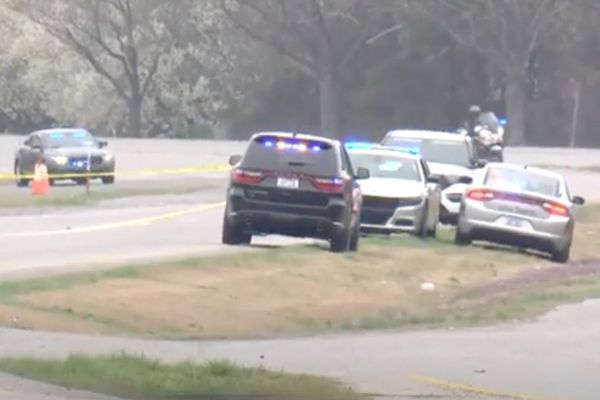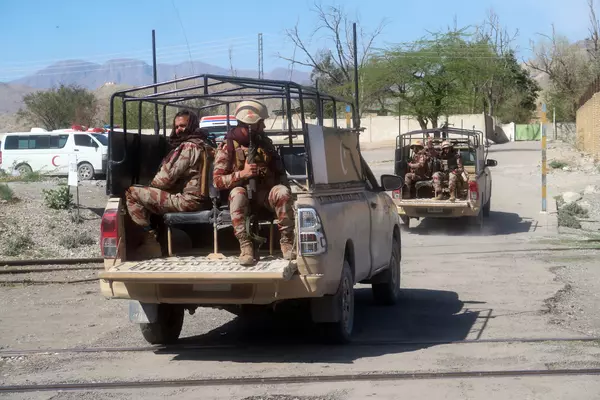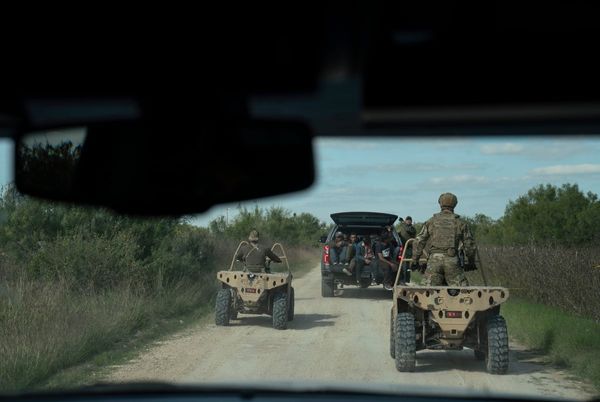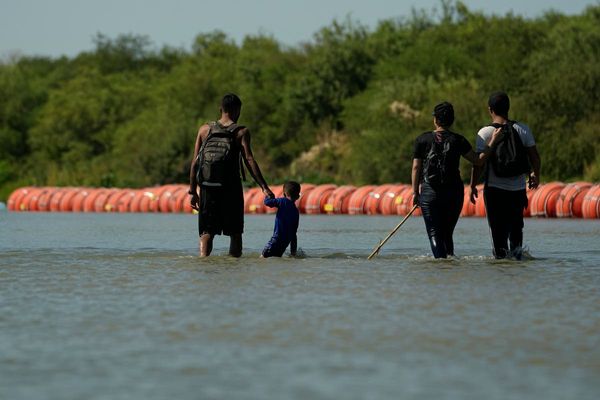/https://static.texastribune.org/media/files/d020b70da9149ff56071af1e6e990b8b/whatsapponborder_header_copy.jpg)
This article is co-published and co-reported with Military Times, an independent news organization reporting on issues important to the U.S. military. Sign up for its daily Early Bird Brief newsletter here.
Editor’s note: This story contains explicit language.
When officers from the Texas National Guard showed up to their 7 a.m. meeting with federal agents from Homeland Security Investigations in El Paso, they didn’t arrive empty-handed.
Six military intelligence officials turned over a list of names at the February 2022 meeting. The Texans were part of an intelligence directorate supporting Operation Lone Star, Gov. Greg Abbott's state-run border mission. The officers, which included the group’s top two leaders, told federal agents they’d secretly infiltrated invite-only WhatsApp group chats filled with migrants and smugglers and wanted their help investigating the targets they’d identified, according to a sworn statement attached to a whistleblower complaint filed later that month.
The Homeland Security officials in the meeting rebuffed the Texans on the spot — with one official saying that they were an investigative body and “not an intelligence agency,” the whistleblower recalled.
An investigation by Military Times and The Texas Tribune has found that Texas National Guard leaders disbanded Operation Lone Star’s intelligence wing after whistleblowers reported the WhatsApp surveillance, which targeted migrant groups to track them through Mexico, because they believed it violated long-standing rules against state-run spy operations. During the same period, another team from the intelligence directorate allegedly sent classified FBI intelligence to their Texas Guard colleagues in an apparent violation of federal secrecy laws, according to an internal incident report.
At least four intelligence officers have faced interim administrative discipline in the debacle’s wake:
- Lt. Col. David “Eric” Tyler led the border intelligence section from December 2021 to fall 2022.
- Maj. Dezi J. Rios, the intelligence wing’s deputy director, allegedly oversaw the WhatsApp collection operation.
- Chief Warrant Officer 2 Eric E. Hack led the El Paso team that allegedly shared classified FBI intelligence.
- Then-1st Lt. Emmanuel L. Pierre, a military intelligence officer from a subordinate unit, allegedly began the WhatsApp intelligence operation about a month before Rios arrived at the border.
The Texas Military Department’s inspector general, with assistance from the National Guard Bureau, investigated “potential questionable intelligence activities,” the agency confirmed in response to questions for this story. The agency said in a statement that the watchdog concluded its investigation in September 2022 but has not yet shared its final report, adding that it will “finalize” discipline once leaders receive it. Leaders initially reorganized and eventually disbanded the intelligence directorate in fall 2022, folding the remaining personnel into the mission’s operations section, a source familiar with the mission’s organization said.
According to an official document that Rios provided to Military Times and the Tribune summarizing part of the investigation, the inspector general’s office found that the WhatsApp scheme was an unauthorized foreign intelligence operation and faulted Rios for overseeing Pierre’s work — a finding Rios disputes. It’s unclear if the inspector general concluded that any other officers broke the rules.
Two of the implicated officers, Tyler and Rios, told Military Times and the Tribune that senior leaders set them up to take the fall for the operation. Both claimed they shared concerns about the legality of Pierre’s WhatsApp work to the mission’s top brass at the time, Brig. Gen. Monie Ulis and Col. Kevin Boates, but were unable to convince them to end it.
According to a sworn statement Rios made June 25, he and state intelligence officials “were unable to convince [Col.] Boates or [Brig. Gen.] Ulis” to stop the WhatsApp operation. In a Dec. 27, 2021 email — obtained through an open records request — Rios claimed to have “expressed my reservations with [Col.] Boates and [Brig. Gen.] Ulis” about the WhatsApp operation to no avail.
In his sworn statement — included in his own June complaint with the inspector general alleging the state failed to set clear guidelines for intelligence activity at the border — Rios said Boates “ordered me to oversee” Pierre’s WhatsApp operation while simultaneously blocking Rios from stopping it. He filed the complaint because the investigation blocked his promotion to lieutenant colonel, he said.
Tyler, who has served in the Texas Guard for 33 years, said through his attorney that he was “disappointed that … I’m being sanctioned based [on] an investigation report that I’m not allowed to see.” The lieutenant colonel added, “I assume the reason that they won’t tell me anything or provide me any evidence is that if I somehow failed to supervise a junior officer that reported directly to [Brig. Gen.] Ulis, then Ulis should be accountable.”
Ulis was appointed as the deputy commanding general of U.S. Army South in June, a role held simultaneously with his appointment as the state’s assistant adjutant general.
Hack, Boates and Ulis did not respond to interview requests made via phone and email. Pierre declined to comment.
For this story, Military Times and the Tribune obtained more than 750 pages of internal Texas Guard records, spoke with intelligence oversight experts, and interviewed three verified Texas National Guard service members who had direct knowledge of the events. They requested anonymity because they feared retaliation from state officials and have not been accused of wrongdoing.
“Uniquely vulnerable to abuse”
When the WhatsApp intelligence operation began in fall 2021, Operation Lone Star was undergoing a multibillion-dollar expansion from a lean, volunteer-staffed outfit into a long-term domestic military deployment of unprecedented scale staffed by part-time troops who are effectively temporary state employees.
The pseudo-military mission — which at its height deployed 10,000 Guard members across the state — had growing pains, including payroll problems and poor living conditions for the service members, that occurred due to poor planning and a lack of bureaucratic preparedness. Its intelligence efforts weren’t exempt from the planning gaps.
/https://static.texastribune.org/media/files/07ee34e4cb93933d645bf661bc455248/Roma%20Border%20Crossing%20SP%20TT%201455.jpg)
Operation Lone Star’s commanders demanded military-style intelligence from their intelligence personnel, according to Tyler and three other troops with direct knowledge of the work.
“Everyone [in charge] wanted to pretend it was like Iraq in 2003,” one service member said in an interview. “They wanted to do Army stuff, even though this is [legally] not Army stuff.”
“All the Generals wanted to know about the next mass migration,” Tyler said through his attorney in an email when asked if he was ever pressured to violate intel rules.
According to official planning documents and three soldiers with knowledge of the mission, leaders directed the border intelligence wing to detect the “capabilities of transnational criminal organizations” in Mexico and track their “criminal activity,” in addition to predicting where migrants would try to cross the border.
Such intelligence work is essentially unheard of for National Guard members on state active duty — a state-funded status typically used for short-lived missions. Typically, Guard intelligence personnel deployed under such orders are limited to predicting and assessing the severity of disaster damage, perhaps following a storm or during riots.
The demand for intelligence posed a problem, too. According to National Guard Bureau regulations and a Guard intelligence representative, personnel on state active duty are barred from doing national security foreign intelligence work, and they’re banned from using Defense Department intelligence systems or techniques, known as tradecraft. Instead, they may, to the extent permitted by state law and regulations, support partner law enforcement agencies.
State-level intelligence oversight officials wanted to coordinate closely with the National Guard Bureau to ensure compliance. But as transgressions piled up, one state intelligence official, Chief Warrant Officer 4 X’Lenske Sampson, emailed border intelligence officers and warned of “the potential fallout if the media [were] to find out or assume the Texas National Guard is conducting Intelligence Operations on the border.”
Sampson did not respond to interview requests.
His counterparts on the border — including Tyler, the top intelligence officer there — disagreed and argued via email that federal regulations didn’t apply to their conduct on state duty so long as they didn’t use federally controlled intelligence systems and tools. Tyler’s attorney, Doug O’Connell, echoed that argument in an Aug. 16 statement to Military Times and the Tribune.
“Any competent attorney that understands basic Constitutional law will tell you that when the militia is deployed by the Governor, for a state mission, federal regulations are inapplicable unless federal funds or equipment are involved,” O’Connell said.
Tyler chafed at the restrictions.
“All I get is ‘No,’” he lamented in a February 2022 email to a state official over limits on intelligence training. “I need a way to ‘Yes.’”
The internal documents show widespread confusion and debate over what rules applied and when. And with intelligence work, the stakes are high — today’s strict oversight procedures exist because Defense Department personnel ran massive domestic intelligence operations during the Vietnam War that targeted Americans based solely on how they legally exercised their First Amendment rights.
National Guard intelligence efforts like the WhatsApp operation are “uniquely vulnerable to abuse” without prior coordination with state and federal law enforcement, said lawyer Charles McCullough, who oversaw intelligence oversight for the intelligence community’s 18 civilian and military organizations from 2011 to 2017 as its Senate-confirmed inspector general.
McCullough, who also served as the National Security Agency’s top investigator, described the authorities governing intelligence work as “overlapping and arcane,” and said that the Texas Military Department, like any agency undertaking such an effort, owed clearer guidelines to its personnel from the mission’s outset.
The former watchdog added that if commanders override concerns from intelligence oversight officials — as two implicated officers claim Boates and Ulis did — they should bear responsibility for any violations.
Michael German, a former FBI special agent who studies intelligence policy as a fellow at the Brennan Center for Justice at New York University School of Law, warned that if states try to run their own foreign military intelligence operations, they risk upsetting the delicate ecosystem of international diplomacy with unpredictable spin-off effects.
German also said operations like the WhatsApp scheme put intelligence operatives at risk and endanger national security.
“Having untrained people running ad hoc operations puts them at risk and dilutes the value of [real intelligence]...because it gets mixed with information that doesn’t go through the same vetting process,” he said. “Adding another layer of inappropriate [intelligence] activities isn’t making America safer.”
Burners on the border
When around 15,000 migrants of Haitian descent streamed across the Rio Grande near Del Rio in September 2021, then-1st Lt. Emmanuel Pierre found new demand for a decades-old skill set.
/https://static.texastribune.org/media/files/f0bbdd099c6f5ec32aebc5d3c04c400b/Del%20Rio%20Migrants%20Surge%20JV%20TT%2036.jpg)
Pierre was born in Haiti in 1978, according to a 2017 interview. The native Haitian Creole speaker learned English and translated for U.S. and United Nations personnel before immigrating to Florida. He enlisted in the Army in 2006, and eventually became a Texas National Guard intelligence officer.
After volunteering for Operation Lone Star in early 2021, the lieutenant quickly became an assistant intelligence officer based in Weslaco with Task Force Salerno, which later became Task Force East after the border mission expanded, three sources said.
According to internal emails, Texas Department of Public Safety and Border Patrol officials tapped Pierre as a translator during the Del Rio crisis, authorizing him to wear civilian clothes.
The emails offer conflicting tales. In one version, Pierre simply translated. Other officials claimed the intelligence officer concealed his identity and did “clandestine” interviews on U.S. soil, possibly violating rules against using human intelligence “tradecraft” while on state duty.
An official from Customs and Border Protection, the parent agency of Border Patrol, denied that its agents requested Pierre — or any Texas Guards member — for translation services during the Del Rio crisis. The Texas Department of Public Safety did not respond to emailed questions.
But all accounts agreed on one thing: Pierre carried a cellphone that had access to WhatsApp chats from migrants and smugglers. Many migrants use the encrypted messaging app to communicate internationally during their journey to the United States.
In an email to Tyler, Rios claimed that Boates, the Operation Lone Star deputy commander, purchased the phone for Pierre.
The WhatsApp chats were in English, Creole and Spanish, later emails claimed.
Texas intelligence officials were alarmed by Pierre’s conduct.
On Oct. 26, 2021, a state intelligence officer, Chief Warrant Officer 3 Matthew Sugars, emailed the border intelligence directorate to request written statements about the work a soldier — whose name was redacted in records — did with Border Patrol intelligence agents. Sugars did not respond to an interview request. Three people from the mission identified the redacted soldier as Pierre.
In the days following Sugars’ email, he and border mission officials feverishly worked to update their “guidance” for intelligence personnel on the border. But the two sides struggled to settle on a rulebook, and a final version was not completed for about 10 weeks. As they debated, the WhatsApp operation continued.
Boates, the mission’s deputy commander, shot a Nov. 4, 2021, email to Rios ordering him “to assist with analysis of the information” that Pierre received on the phone.
In order to comply, Rios began monitoring Pierre’s WhatsApp activity through a DoD computer linked to the phone, according to the whistleblower’s sworn statement and emails from state officials. Investigators later found he used the computer between Nov. 1, 2021, and April 2022, though he disputed that timeline.
Rios also assigned a junior soldier to translate Spanish messages from the migrant groups, two sources and documents confirmed. A Guards member with knowledge of the operation said Rios “would have her just go in and ask questions,” but could not definitively say what she asked. The source noted that under federal authority, sending messages in targeted conversations, as opposed to passive listening, requires high-level approvals and strict controls.
/https://static.texastribune.org/media/files/535affb3895fb32627007e6081399d8a/Dec%2020%20IPA%20TT%2019.jpg)
In his June 2023 sworn statement and his contemporaneous emails, Rios insisted he used the WhatsApp-linked computer to monitor Pierre for potential wrongdoing. He reiterated this argument in interviews, and he also emphasized Boates’ alleged role directing the operation.
Because Rios wouldn’t let others use the computer, his peers and subordinates grew suspicious, a whistleblower’s sworn statement said.
Alarm bells
In late December 2021, a service member on the border mission reported Pierre’s WhatsApp work as questionable intelligence activity. It was the first of three such reports confirmed by Military Times and the Tribune.
A former signals intelligence specialist who spoke with Military Times and the Tribune likened such reports to pulling the emergency brake on a car — they often immediately shut down units for investigation.
“Even the accusation of a questionable intelligence activity could bring an office to an immediate halt,” said the specialist, who requested anonymity because he works on defense contracts.
State officials tried to do that after receiving the complaint.
Air Force Maj. Meredith Zinni, a state intelligence officer, sent an urgent email on Dec. 30, 2021, that announced the complaint against Pierre’s “continued clandestine style operations.” Zinni, who did not respond to an interview request, insisted that the WhatsApp operation “MUST IMMEDIATELY CEASE.”
In a subsequent email, Sugars also said “all actions” Pierre had taken using WhatsApp violated National Guard restrictions banning intelligence work while on state active duty. He claimed Texas Military Department attorneys agreed the actions “are violations of [state active duty] status.”
Tyler waited a week before he ordered Pierre to stop communicating with “any foreign national using WhatsApp or any other app or platform” on Jan. 6, 2022. A week later, Tyler asked Rios to help monitor Pierre for violations of that order, according to an email and a statement from his attorney.
But the lieutenant colonel also argued the state was wrong about how and when intelligence oversight rules applied, claiming Operation Lone Star and Pierre’s actions presented a “unique situation.”
Rios claimed the WhatsApp operation ended in January 2022, when he transitioned to preserving evidence of Pierre’s transgressions, according to emails and statements he wrote. But another soldier’s questionable intelligence activity report claimed Rios, through his computer, had access to the WhatsApp account and used it for more than monitoring.
/https://static.texastribune.org/media/files/9c1979c32b425de435eb3ee2a25dcc7c/Temp%20Migrant%20Processing%20El%20Paso%20JV%20TT%2018.jpg)
The soldier’s report was made in the wake of the Feb. 1, 2022, meeting with Homeland Security Investigations officials, where the Texans purportedly presented the list of names gathered from WhatsApp for further investigation. The complainant attended the meeting, which they detailed in a sworn statement to investigators.
Rios and Tyler, who were the senior Texas Guard intelligence officials present that day, confirmed the meeting occurred but denied handing over a list of names from WhatsApp.
According to documents and Guard members with knowledge of the events, investigators stepped in after the soldier’s report and started interviews about the WhatsApp operation in March 2022. The Texas Military Department confirmed its inspector general investigation, which began at an unspecified date, brought in “National Guard Bureau intelligence oversight officials” for assistance that same month.
It’s unclear why Texas National Guard officials tapped Rios as the mission’s deputy intelligence director in October 2021. The intel officer had resigned from the San Antonio Police Department that same month after his involvement in a third road rage incident in four years led to misdemeanor criminal charges. (In May 2023, the Bexar County district attorney’s office ultimately dropped the charges against Rios. The former police officer was not arrested or charged in connection with the first two road rage incidents.)
Secrets spilled
Meanwhile, another policy debate raged over Operation Lone Star’s efforts to embed intelligence officers with federal agencies throughout Texas.
It had been months in the making.
In January 2022, the FBI’s El Paso Field Office invited Operation Lone Star to embed a small team there to bolster its intelligence ranks. The FBI’s invitation email also noted that a memorandum of understanding, or MOU, would set limits on who could work on what and when. Such agreements also delineate access to classified information.
Similar arrangements had been successful elsewhere. Under formal agreements in Laredo, a number of Texas Guard members successfully joined an anti-cartel joint law enforcement task force named Blue Indigo.
But El Paso’s FBI agreement was never signed amid various delays and leadership changes.
Meanwhile, Hack, the intelligence warrant officer whose civilian job was as an intel analyst at the FBI’s El Paso office, moved home and embedded in his old workplace as an Operation Lone Star representative. A second soldier joined him there.
An operations officer on the border mission learned of the El Paso team in late March and filed a questionable intelligence activity whistleblower report on April 1, 2022, that included screenshots of messages and phone records.
The officer argued that the collaboration violated intelligence oversight rules because there wasn’t a signed MOU.
The officer did not respond to an interview request from Military Times and the Tribune.
Within hours of the report, Tyler argued with state intelligence officials again over the legal authorities that allowed state active duty soldiers to work with federal agencies. In an April 3, 2022, email, he claimed that National Guard Bureau intelligence oversight procedures don’t apply to Operation Lone Star.
But then, in late May 2022, Hack’s team at the FBI El Paso field office allegedly “used classified systems that were not authorized” and sent classified FBI intelligence back to Operation Lone Star, according to an internal Texas Guard incident report.
A service member from the mission said the incident occurred on May 24, and the internal report said that state intelligence officials discovered it May 26.
Fallout
Within days of the alleged spill, the Texas Guard suspended Tyler’s security clearance, and investigators came calling, according to emails he sent in June 2022. The lieutenant colonel told investigators he thought they were “misled and misinformed,” arguing that any transgressions were born of “confusion.”
Hack’s military personnel record was flagged for administrative investigation on June 2, 2022, the day of the incident report, and he was sent home from the border mission. Flagged troops are blocked from awards, promotions or other favorable personnel actions.
Classified document spills can be punished as criminal offenses, but they’re often quietly handled via administrative means, according to German, a fellow at the Brennan Center. He decried the practice.
“If you’re not going to get in trouble for breaking the rules, and you have a very important issue, the rules aren’t going to be a very strong bulwark against that kind of abuse,” he said.
It’s not clear whether Hack has faced any formal discipline in either his military or civilian careers. The FBI, through an unnamed spokesperson, refused to comment on Hack or his status.
“The FBI takes the unauthorized removal, retention or transmission of sensitive information, whether classified or unclassified, very seriously and will continue its commitment to prevent any mishandling of sensitive information,” the bureau said.
Rios and Tyler were sent home from Operation Lone Star in fall 2022 amid the investigations, they confirmed to Military Times and the Tribune.
According to the partial summary of the investigative report Rios provided, the inspector general substantiated intelligence oversight violations by at least Pierre and Rios. The officer received the document, a summary of “adverse information” in a restricted Army database, because the investigation’s findings blocked his promotion to lieutenant colonel. Military Times and the Tribune could not independently confirm whether other officers had adverse findings.
But it was nearly a year before Tyler, Rios and Pierre also received administrative investigation flags on their military personnel records in May 2023 — one day after Rios emailed a Texas Military Department general to ask why his promotion had been blocked. Tyler and Rios also confirmed that their security clearances are suspended.
The three anonymous service members who spoke with Military Times and the Tribune said their experience left them disillusioned. They lost faith in the Texas National Guard’s ability to ethically execute its missions.
“If they’re willing to compromise their integrity over something like that,” one soldier asked, “who knows where they’ll stop?
/https://static.texastribune.org/media/files/c50ee6d1deec029b9663d1af3b1dc140/Operation%20Lone%20Star%20VGC%20TT%2022.jpg)
A second service member said he’s fearful that other states might use federally trained intelligence troops in state-run intelligence operations unless the federal government makes an example out of Texas.
“You give intel soldiers enough tools — we’re violating many constitutional rights very quickly,” he added.
The third was shaken by what he felt was a failure by Texas National Guard leaders to use its intelligence troops in a legal and effective manner.
The service member said a Guards member from the border intel directorate had volunteered to build a tool to track the Rio Grande’s water flow and alert leaders when conditions were unsafe for migrants and soldiers alike, but it was deemed “not important.” Spc. Bishop Evans, a 22-year-old Guard member from Arlington, drowned trying to save two migrants in April 2022.
“And that’s the frustrating thing about this,” he said. “We did all this shit, we broke all these rules. And for…”
He trailed off.
The full program is now LIVE for the 2023 Texas Tribune Festival, happening Sept. 21-23 in Austin. Explore the program featuring more than 100 unforgettable conversations coming to TribFest. Panel topics include the biggest 2024 races and what’s ahead, how big cities in Texas and around the country are changing, the integrity of upcoming elections and so much more. See the full program.
Correction, : In a previous version of this story, a helicopter was incorrectly identified in a photo caption as belonging to Customs and Border Protection. It is the property of the Texas Department of Public Safety.










